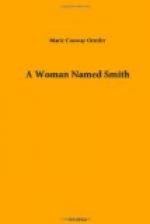“Oh, no: I heard it, too.” Mr. Johnson looked at The Author with a concerned face. “You’re getting a bit off your nerves, Chief. Anybody might play a violin.”
“Anybody might, but few do play it as I thought I heard it played last night. Who’s the player, Miss Smith?”
“I haven’t the slightest idea. Alicia thinks it’s a spirit that lives in the crape-myrtle trees.”
I was beginning to be aweary of The Author’s shrewd eyes and persistent questioning, and I was heartily glad when he had to go back to his work.
That was a gray and windless afternoon, and the house was full of those bluish shadows that belong to gray days; it was charged, even more than usual, with mystery: the whole atmosphere tingled with it as with electricity. I couldn’t read. I have never been able to play upon any musical instrument, much as I love music. I do not sing, either, except in a small-beer voice; and when I tried to sew I pricked my fingers with the needle. I went into the kitchen, consulted with Mary Magdalen as to the evening’s dinner, weighed and measured such ingredients as she needed, saw that the two maids were following instructions, tried to make friends with Beautiful Dog, until he howled with anguish and affliction and fled as from pestilence; and, unable to endure the house any longer, put on my hat and set out upon one of those aimless walks one takes in a land where all walks are lovely.
Automobiles came and went upon the public road, and to escape them I crossed a wooden foot-bridge spanning a weedy ditch, struck into a path bordering a wide field followed it aimlessly for a while, and before I knew it was in the Enchanted Wood.
The Enchanted Wood was carpeted with brown and sweet-smelling pine-needles, with green clumps of honeysuckle breaking out here and there in moist spots. There were cassena bushes, full of vivid scarlet berries; and crooked, gray-green cedars; and brown boles of pine-trees; and the shallowest, gayest, absurdest little thread of a brook giggling as it went about its important business of keeping a lip of woodland green.
It was very, very still there, somewhat as Gethsemane might have been, I fancy. I had wanted to be alone, that I might wrestle with my trouble. Yet now that I was facing it, my spirit quailed. Never had I felt so desolate, or dreamed that the human heart could bear such anguish.
If I had had the faintest warning, that I might have saved myself! If I had never come to Hynds House at all, but had lived my busy, matter-of-fact, quiet life! Yet the idea of never having seen him, never having loved him, was more cruel than the cruellest suffering that loving entailed. It was harder even than the thought that Alicia and I cared for the same man, who perhaps cared for neither of us. At that I fell into an agony of weeping.
That passed. I was spent and empty. But the calm of acceptance had come. I wasn’t to lose my grip, nor wear the willow. The idea of me, Sophy Smith, wearing the willow, aroused my English common-sense. I refused to be ridiculous.




